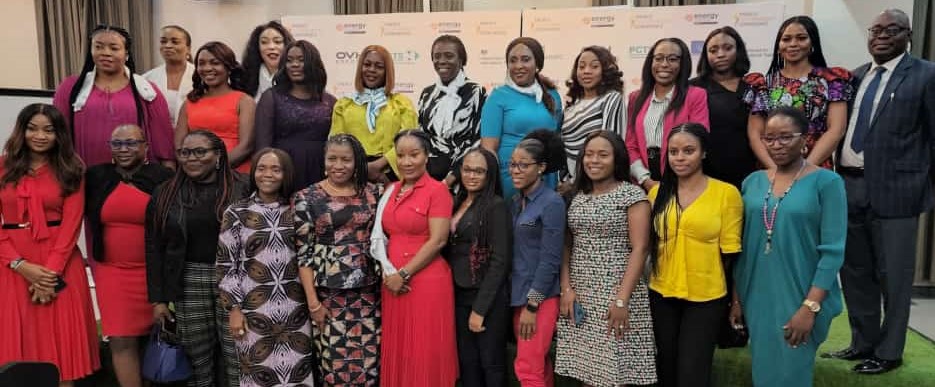Nigeria needs female talents to meet economic aspirations __WIEN President

![]()
President of the foremost Women in Energy Network (WIEN), Mrs Eyono Fatai-Williams, is steel strengthened woman with tall corporate pedigree. Her managerial and leadership experience runs across key sectors of the Nigerian economy. While currently deploying her depth of knowledge in running her enterprise, she leads the team of Nigeria’s most powerful female energy industry professionals in driving a compelling advocacy for gender diversity, equity and inclusion (DEI) in the industry. In this chat, Mrs Fatai-Williams insists that time has come ‘to make a room, and put up a chair for women at every corporate leadership table in the energy sector.’
Enjoy the excerpt.

There appears to be a clear misunderstanding between your agenda for gender balancing and what the people interpret as gender competition in the industry. So, how do you begin to address the fears of men who think they are now endangered by your diversity, equity and inclusiveness in the industry?
Okay, I think the important thing is that data does not lie; and the statistics are clear. I think Dr.IbilolaAmao quoted one with the percentage of female representation in the industry still under 20 %. So, clearly there should be 80% left. Over 80% should not feel threatened that we are competing for space. There is so much space.
I think it is important that we put the numbers out there to say that this effort is being made because, again, research has shown that when you have diversity, particularly in the leadership, in the board, in the management, the company actually hits the bottom-line. The company will do better. So, the statistics is clear on that. So we will also be presenting the statistics.
We will also probably commission a research to put these numbers out there to justify why we are doing what we are doing. Having less than 20% female representation in an industry that is desperate for talent is just not good enough. It means that there is a talent pool that the industry is not benefiting from and that is where organizations like WIEN come in. We want to make sure that we support the Nigerian energy sector to have, in terms of gender representation, diversity and inclusion to have access to this talent pool that will help the energy transition and getting Nigeria to where she wants to be.
Nigeria has a huge female population; young female population. We must tap from the pool of these experienced women. Nigeria needs to tap into that; and that is where an organization like WIEN comes in. So, we want to assure the men that numbers tell a very different story. There is no need to feel threatened. They have 80%, so there is no need to feel threatened.
Madam President I appreciate most times when you tell us that you are a mother. And on the other side, you stand solid for gender equity. How would people begin to manage your dual personality when it comes to DEI advocacy?
The same way you manage the dual personality when my husband has to step out to pick up his daughter from school because it is time to do so. The same way they will manage the dual personality when he needs to step out to take care of family emergency because something has happened. Why should it be seen differently if I am doing that and seen differently if he is doing it?
There are such situations at home that I can’t deal with .When it comes to, I am afraid again, the biases that we grew up with: when the generator goes off, he deals with that. If he steps out to do it, nobody says he is doing it because he is a man. He is doing because it is a responsibility he has.
So, I think for us women, we want to say, look at what I am bringing to the table. If I need to step out to manage an emergency, you need to see that not through the gender lens but through the lens of somebody who has a situation and has to deal with that situation. If I give excuses on my job, then you will see me as an irresponsible person not because I am a female but because I am just downright irresponsible.
So, I think that those inherent biases we have grown up with, we have to deal with them. Even now, in bringing up my own family, very consciously, I will not tell my daughter to go and wash the car but I will tell her to go make breakfast. I won’t say to my nephew go and make breakfast but I will tell him to go clean the car outside. So, I contribute to those biases and we have got to deal with them. So, from home even we the mothers contribute a lot to these things. And we have to begin to change that mind-set: that people are just human beings; they have something to do.
I know people who don’t cook. Their husbands cook in Nigeria. It doesn’t make them lesser females or lesser males. It doesn’t, it is just the domestic chores we decided to give ourselves at home. So, I think that we need to look at the executives or leaders as people and not through the gender lens.
Your explanations appear to be rooted in culture and traditions. We all know that these things take a long time wear out and change. It is a generational change. So, how quickly do you expect the kind of result we need in this kind of change?
I think I will answer that question from experience in my 30-plus-years of working. I have seen change. When I was a young manager, an executive could say to me ‘I need your seat for a man. A man sitting on your chair will feed the whole village .Your husband has money, what are you doing at work?’ He could say that in 2000, 2001, 2002, but you can’t say that today.
So, we have made progress-significant progress. Today, men would check themselves before they say those things. Today, sexual harassment has come to the fore. Today, having a panel that is all male, no female, is rare. People now make the effort. They will say to you ‘I didn’t find a woman.’
So we have come a long way. Whether it will happen in my life time or not I don’t know, but what makes me happy and what we are about in Women In Energy Network is to keep that discussion going on. It must be kept in the front burner until those biases fizzle away. Each time those biases show up, we are losing out on values that should be brought to the table because you over looked a woman who probably has the answer, or you over looked a man because in some kind of diversity, you bypassed him by the virtue of where he comes from.
Any kind of situation where there is no inclusion is an opportunity to bring it to the table. And in Nigeria, with the Japa syndrome, we can’t afford it. Our young bright minds are leaving; we can’t afford it. So, old, young or middle age; we need to pool in as many people that have values to bring to the table.
There is a significant observation that even the feed channel is beginning to dry up, where women begin to drop off before they begin to reach certain position in the industry. That is not as a matter of gender bias because it has to do with other roles women play in the society. So, how do we keep younger talents in the system to have enough resources to push forward?
It’s by calling on our HR teams, particularly, the human development and the talent management or talent development arms of HR. When you identify talent, you have a planning window for them. It takes a 10-15 years view.
If this person is here for the next 10 years, what are the different jobs she will do? So, when you look at female talents, there is nothing anybody can do about the fact that a woman who gets pregnant if she chooses to will have babies at some stage and plan her career around her own developmental milestone as a woman. If you are planning that she will take a technical role and then a non-technical (because that is how careers are planned for those who you spotted to be leaders and you plan their careers), you must take these into consideration. Because, you spend – at least I know that the big companies spend fortunes recruiting these young boys and girls – an absolute fortune; you spend that kind of money because your business depends on these talents.
So, if you spend billions bringing them in, spend a bit of time planning their careers and planning around what works for them so that they will continue to deliver values for the company.
So, it is the HR team that you are placing a demand on to do this. And there is nothing wrong in doing that. Even when you plan careers for men you are planning career around how you will see them grow. The same for women. If a woman is in the field, plan when she can go on a call off, when she has to do this and when she can go offshore and when she cannot. Take a long time window. And when you do that there is no way that talent will not deliver to you, to the company in the long-term.
Everyone agrees that things are better now than they were previous 10 years. Would you say that WIEN’s advocacy is beginning to yield positive results?
I think that in the three years that we have existed that we can have the sort of conversation just shows that the WIEN advocacy is beginning to get attention. The first batch, we are where we are because PETAN gave us a platform. The Society of Petroleum Engineers (SPEs) was represented. It means they are beginning to listen to us. They are beginning to listen because we ourselves have a responsibility to showcase a professional network that is serious, transparent, structured and has good governance. And that is what we bring to the table.
For us, that is our unique selling point. We will not give you women who don’t know what they are doing, but will showcase women who are good at what they do.
From our secretariat, our Executive Secretary is an engineer. So, we are putting our money where our mouth is. And we are showcasing what we have. I think the industry is beginning to listen.
The next level is where we can collaborate with the government and regulatory authorities, with societies like PETAN and SPE to say ‘we have a matured mentorship scheme, subscribe to it. We have a STEM programme, subscribe to it. You know, we want to pull young people together into internship, create opportunities so that these women can come in and do their internships. We have an incubator programme that is on paper, we need support.’
We are an NGO; so, we have no money. Money comes from the membership fees we get and donations from corporate members, but we need the support of the industry. But they are beginning to listen. I think, for me, the response is very encouraging and we are going to follow up on this. It will end better. And we already have collaboration with NGA as diversity partner and they are going to support our STEM and internship programme. It is to first get the industry associations, get the OPTS to do something and then we can move the window. We don’t want to hear an organization saying ‘we could not find women.’ Come to us we will find the women for you.
What of the boy child, do you have concerns about the quality of men our boys turn into?
In a way, when we gather we are talking about the gender gap. So, in the process of the gender gap, we have deliberate programmes where we speak to the girl child. I believe that the way society is today, there should also be deliberate programmes where you are mentoring the boy child to say ‘don’t fall by the way side. ‘Don’t do what you shouldn’t do because you are a boy.’
You know, it is just the same way we are drumming it to the women in mentoring them to close the gender gap. There are many things that come with mentoring, you know: getting them focused. Don’t have low self-esteem, a lot of things bundle into the debate. It is those extra things that bundle with mentoring they should be doing for young boys to say ‘don’t forget the reason why you are here. Don’t have an entitlement mentality because I am the first son I will take care of everything.’ The world has moved away from that. You must bring value. Being a man doesn’t mean you bring value. So, I think there is room for that in terms of those extra things we do for the girls.
There was a call for data based advocacy. So, how would WIEN raise the gender dashboard to the full focus of regulators and corporate players in the industry?
It is something that we are working on. We have seen that in some of the Western countries. There are data that show clearly where women are and what the gender gaps are in the strata of the energy industry. And we want to focus on this. We have a director for research who is taking it under her umbrella. We actually go to commission a research to bring out the numbers.
Part of the problem in our clime is that we don’t have enough data. So it is something that we are focused on. It is a front-burner item for us because data speaks. Once you show the data you can back it up because it is verifiable. It tells the story. So, it is something we are working on.
What level of collaboration has WIEN been able to forge with key industry stakeholders in ensuring voluntary and incentivised DEI compliance?
I think it is may be a missed opportunity if we fail to call on the industry, the corporate players and regulators to open their doors, collaborate and allow or make a room, and put up a chair for women to sit at the table particularly in the leadership .
If we meet all the OPTS companies, like the first 20-Nigerian firms or the IOCs in Nigeria, we want to see that there is gender implementation at the leadership level. So, that is really something we are calling for. The NCDMB has a diversity sectoral working group. We want to commend NCDMB for that; but we ask them to please do more.
There is more they can do to now begin to touch on the core issues of sponsoring girls in STEM. The core issues: the companies should give us internship opportunities so then women have an opportunity; and having an incubator where women can try their hands and get their businesses to grow.
So, on those two issues we are commending NCDMB. We are asking them and other agencies to do more.




